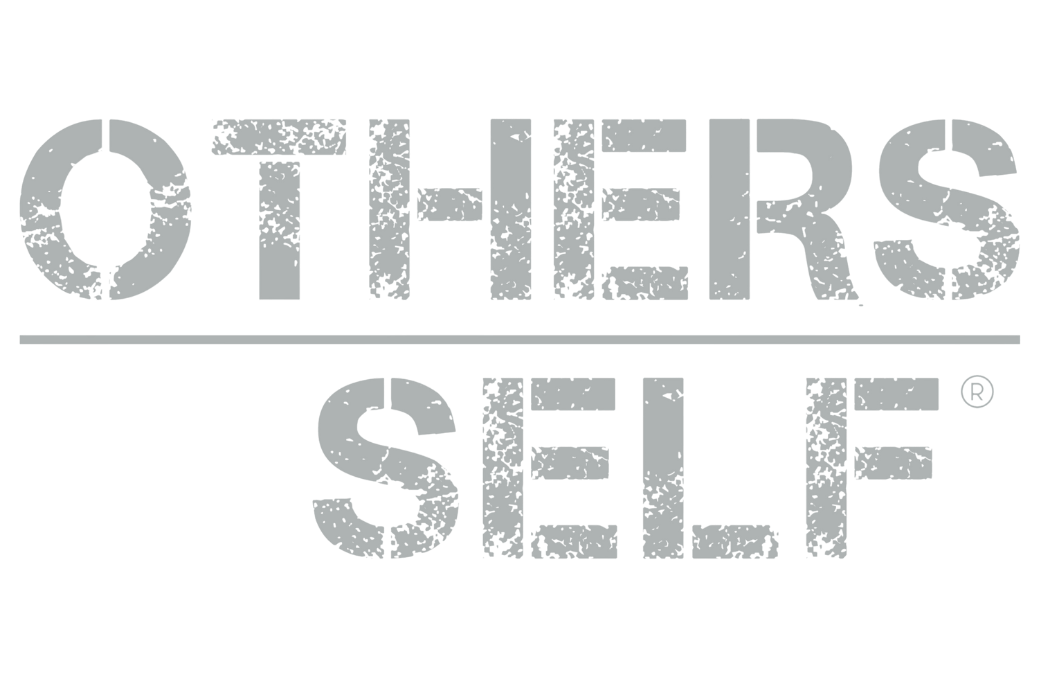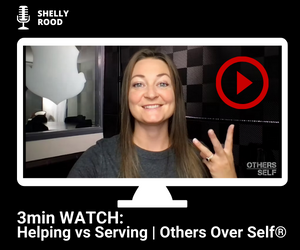Taking the leap and connecting with military people can be hard. Aside from the go-to line, “Thank you for your service,” what do you say to the group of veterans at the table next to you? Increase your confidence by learning these four ways to make a meaningful connection with military people, and you’ll be making a big impact on the military community as a whole.
I’m Shelly (AKA Captain Rood) and in this post, I’m disclosing a few personal experiences from my life in the military. I’m also sharing the expert (and candid) opinions of three other veterans who now provide professional support services to the military community.
Together, we’ve crafted this article with you in mind, so that you can be confident when striking up conversation with service members, veterans and military families.
Military people love decision makers: we automatically respect you for taking action.

Connecting: Your Response is Just as Important as Your Question
A few years back, my 7-year-old son, Jaxon, was thrilled to be included in the Family Day event hosted at my Army unit. From having our credentials checked at the gate to driving past the tanks, every moment was a moment of awesome.
At lunch time, we entered the assembly hall, filled our plates with BBQ pork and ate next to a wall of American flags. As we were finishing the meal, one of my superior officers took the seat across from us and attempted to strike up conversation. He was asking basic questions to my son, like, “What grade are you in,” and, “What’s your favorite subject in school?”
The interaction was starting off well, and I even remember feeling proud of how maturely my second grader was answering. When it was Jaxon’s turn to contribute to the conversation, he asked the seasoned combat soldier, “What sports did you play in school?”
Well, the Colonel answered saying, “I actually didn’t play sports in school. I just focused on studies and read a lot of books.”
And then, things went south.
Without missing a beat, my 7-year-old replied with sincerity, “Oh…so… you were a nerd.”
My breath caught.
My face turned red.
And I cringed at the thought of all the additional duties coming my way as a result of this interaction (who doesn’t love peeling potatoes?).
Looking back, the Colonel handled the moment with grace and my son and I made it through unscathed.
So, the next time you’re entering into a conversation with a military person, just remember that sometimes even military people say the wrong things to our own kind.

Deciding What to say to Military People
Today’s lesson comes from our 21-page article titled, “4 Ways to Make A Meaningful Connection With Military People,” which you can download for free HERE. And be sure to read Part 1 of this series, “Conversing With Military People: 3 Issues to Watch For.”
Originally written to assist people of faith in having these conversations, these words can benefit all of us. This 2-post series has a dual purpose of: 1) helping you craft your message, and 2) furthering our mission of eliminating the negative stigma around military service.
These resources are being made available to you through our Warriors With Warriors Program: Connecting Spiritual Warriors with Earthly Warriors (more HERE). Funding Disclaimer: The Michigan Department of Health and Human Services, through the Community Mental Health Association of Michigan, has provided funding for this initiative through a Federal Community Mental Health Block Grant and a Substance Abuse Prevention and Treatment Block Grant.
You can’t go wrong asking someone about their family or pets.
General Doug “Odie” Slocum, Article Contributor
If you’re already nodding off like a private during a safety briefing, just remember this tip from General Slocum, “You can’t go wrong asking someone about their family or pets.” After all, military people are just regular people… really cool regular people.
Connecting Tip #1: Ask, “What branch did you serve in?”
This is the most basic, easiest place to start when engaging a service member, veteran or military family in conversation.
It all starts with the branch.
This jargon word, “branch,” is part of a much larger lesson that we teach entitled Military Cultural Competency, and it is designed to help familiarize civilians with military culture. This image, and a few more to follow, are from slides used when teaching that lesson:

Remember career day at high school, when the military had booths set up right next to the civilian companies? Well, the Army is the largest branch and with the implementation of the Space Force, there are now 6 total military branches, which also include the Air Force, Navy, Marines and Coast Guard.
Once the branch is established, you may want to dig deeper into unit identification – this tends to be the series of numbers and letters that people less familiar with the military find confusing, especially since they vary by branch.
Here are a few terms to familiarize yourself with:

Why You Should Ask About Military Unit Identification
Military units have their own unique history. Being assigned to a unit can give the service member a sense of belonging, pride and historical relevance. It can also give you an idea of where they have lived or served.
WATCH: Military branch and unit identification are lessons that the Warriors | Warriors program teaches in our Military Cultural Competency (MCC) module. To watch an abbreviated 20-minute MCC lesson, click HERE for a virtual session recording and jump to 18:40-37:40.
Connecting Tip #2: Ask, “What was your job?”
This is an easy question that can get away from you quickly.
Keep it simple – if the service member, veteran or family member responds with a series of numbers and letters that you don’t understand (such as, “35 Delta”), just ask them what they mean (literally say, “what does that mean?”).
If we are in the Army, the code we are conditioned to respond with is our Military Occupational Specialty (MOS). If we are in the Air Force, it is our Air Force Specialty Code (AFSC).
There are upwards of 190 jobs in the Army alone, and we don’t even have them all memorized, so we don’t expect you to, either. No one will think less of you for being unfamiliar with the acronyms- in fact, we respect you for seeking clarification.
Examples of MOSs / AFSCs:
35D = All Source Tactical Intelligence Officer 11F = Fighter Pilot
11B = Infantryman
25C = Radio Operator-Maintainer
31B = Military Police
MOSs are also related to rank, which is the military pay grade / rank structure. A logical follow-on question you can ask is, “What rank are you?”
As you can see on the chart below, rank also varies by branch, so it’s best to keep conversation light and simple. If you don’t understand their answer, it’s okay to ask, “Is that Officer or Enlisted?”

Finally, it is VERY important that judgment is reserved when they give their answer. After all, how do you feel when your cousin asks you to pass the turkey leg and disclose your financial income in the same breath?
Here are a few more things to keep in mind when learning about someone’s rank or job:
*rank is directly related to pay
*education level is not necessarily related to rank
*gender and race are not related to rank

Connecting Tip #3: Ask, “Why did you join?”
The main takeaway here is that there is no wrong answer. While there are three main categories as possible motivation for why people join the military –
1) sense of duty (good citizenship)
2) love of country (patriotism)
3) pay and benefits (employment) or no other options (desperation)
Every answer, whatever it is, is valid to that person and a service member, veteran or family member should NEVER feel shame in their response. However they answer this question, do your best to validate their answer. Phrases like, “that makes sense,” and, “I can see why you made that choice,” go a long way.

Connecting Tip #4: Ask, “How can I support you?”
If there’s one thing all military people like, it’s action.
We love checklists, timelines and structure. So, if you’re brave enough to ask this question, you had better prepare yourself to respond appropriately and follow through, or all credibility gained during our initial interaction will be lost.
Subjective advice just doesn’t cut it with military people. For example, if you feel compelled to recommend a resource, we expect a direct point of contact and timeline of interaction (have your phone ready!).
A simple gesture can make a big difference; take the time to stop and listen.
Here’s your chance to walk the walk and turn that meaningful conversation into an act of good. People all across the nation are stepping up to show an output of support for the physical and mental wellness of military personnel and the hard truth is that it is very much needed.
Asking a military person how you can support them does three things:
1) It shows us that someone cares enough to take action
2) It forces us to think through what type of support we need
3) It encourages us to be vulnerable and to seek help from others
Getting Real About Military and Veteran Suicide
We dig deeper into this issue in Part 2 of this series, but we it needs to mentioned here as well.
Every day, 22 Veterans are dying by suicide, and that statistic is only getting worse in today’s global climate. Even more heartbreaking is the fact that the number has seen little to no change in previous years.
Suicide is preventable
Dr. Matt Miller, director of the VA Suicide Prevention Program
In 2019, the rate dropped to 17 per day (the lowest in 12 years), but it is back up and suicide remains a significantly higher threat for veterans than for the rest of the U.S. public (source: Military Times). Have hope, for the director of the VA Suicide Prevention Program is saying that, “Suicide is preventable.”
What does this mean? We need you.
Even though it may feel awkward, we are encouraging you to break the silence and show honest interest in the service member in your presence. By doing so, you are contributing to their mental wellness by providing healthy social interaction, a known factor in decreasing suicide rates.
WATCH: The issues of military suicide and substance use are lessons that the Warriors | Warriors program teaches in our Crisis Awareness (CA) module. To watch an abbreviated 20-minute CA lesson, click HERE for the virtual session recording and jump to 37:40-1:00:48.
Ways You Can Show Support
We recognize that it can be taxing to come up with creative ways to serve military people – and even when we do think of a solution, a doubting voice can jump in, asking, “will this even make a difference?”
Yes! You absolutely are making a difference in the lives of military people every time you strike up a simple, 2-minute conversation. We applaud the bravery and sincerity of your efforts – thank you!

We’re here to serve you as you’re taking this interaction to the next step.
The Warriors | Warriors Program created a document to serve this need. In 2021, we published the inaugural “Best Of Guide,” providing people and organizations with proven ways to tangibly serve veterans and military families, and this is being published annually. Click HERE for an immediate download of your free copy.

Our inspiration was… you!
You’re already out in the community doing great things, so we’re shining the spotlight on your efforts so that others can come along to further this shared mission.
If there’s one thing military people like, it’s action.
So, there you have it. If you’ve read this, you are undoubtedly smarter as to how to make a meaningful connection with military people. You’ve learned the best strategies, tips and practices, and even seen examples that we, the authors, have learned during our collective time in service.
Here’s a quick recap on how to move forward:
Connecting With Military People: 4 Ways to be Confident
- ask, “What branch did you serve in?”
- ask, “What was your job?”
- ask, “Why did you join?”
- ask, “How can I support you?”

Still, this knowledge will not yield results…
The EXECUTION of this knowledge is guaranteed to make a difference. Choose one Tip and put it into action the next time you see a military person to interact with. They will appreciate your effort, and you’ll have confidence that you’re making a difference.
Remember, the fall back plan is to always ask about their family or pets… and perhaps try to steer clear of labeling them a “nerd.”
Be sure to read Part 1 of this series, “Conversing With Military People: 3 Issues to Watch For.“
Click HERE for the full 21-page article and to read bios of the four authors: Chaplain Brian Webb, Chaplain Shelly Rood, Brigadier General Doug Slocum (retired) and Licensed Master Social Worker Diana Laskey (all military veterans).






